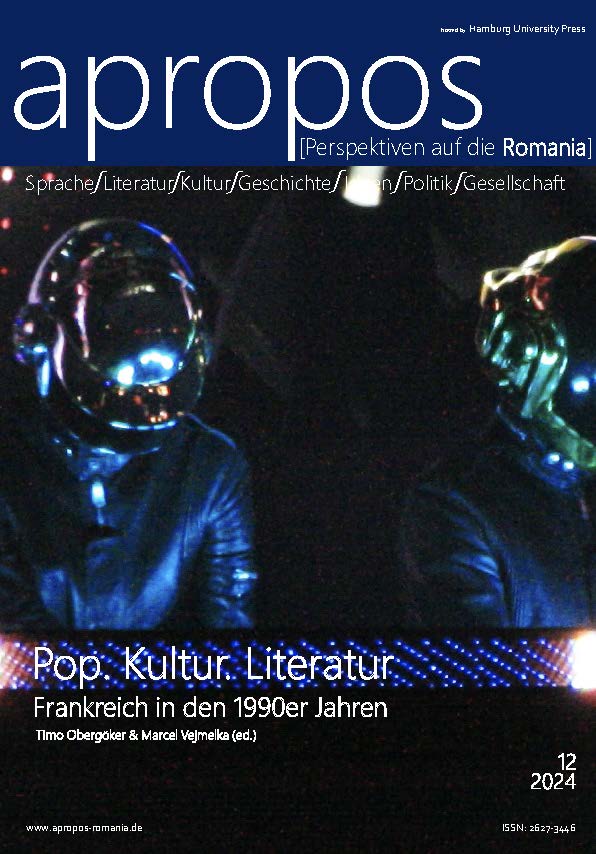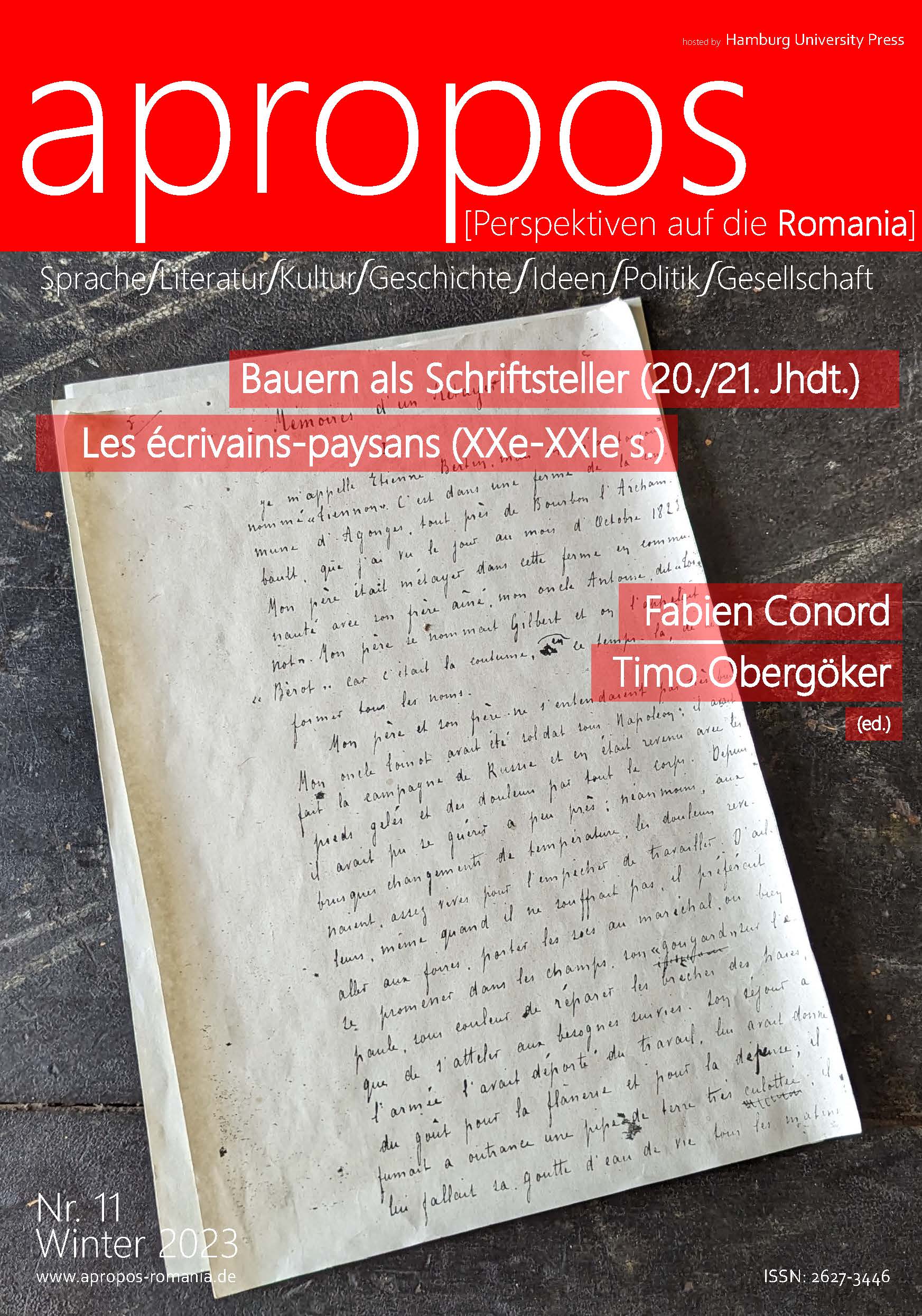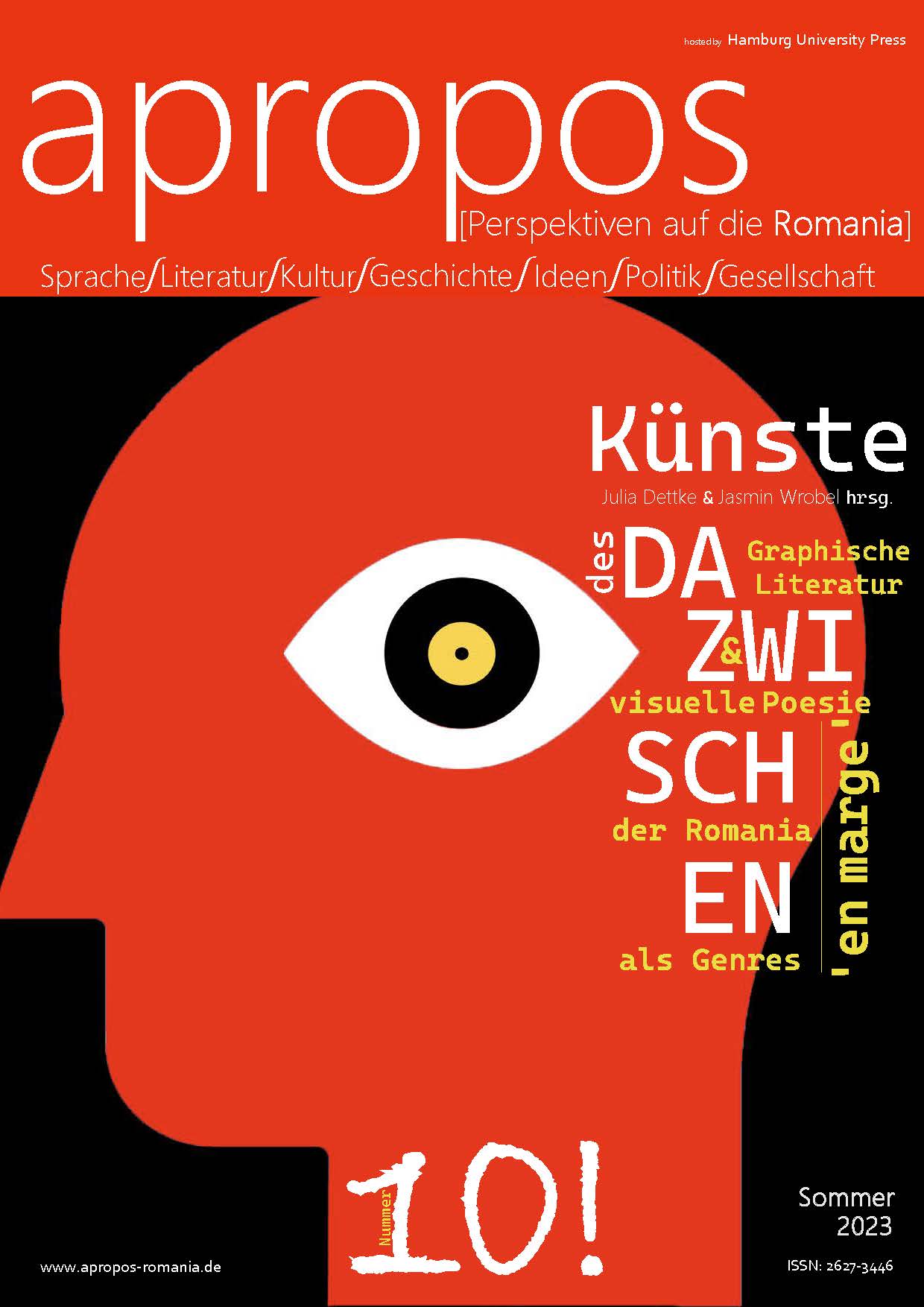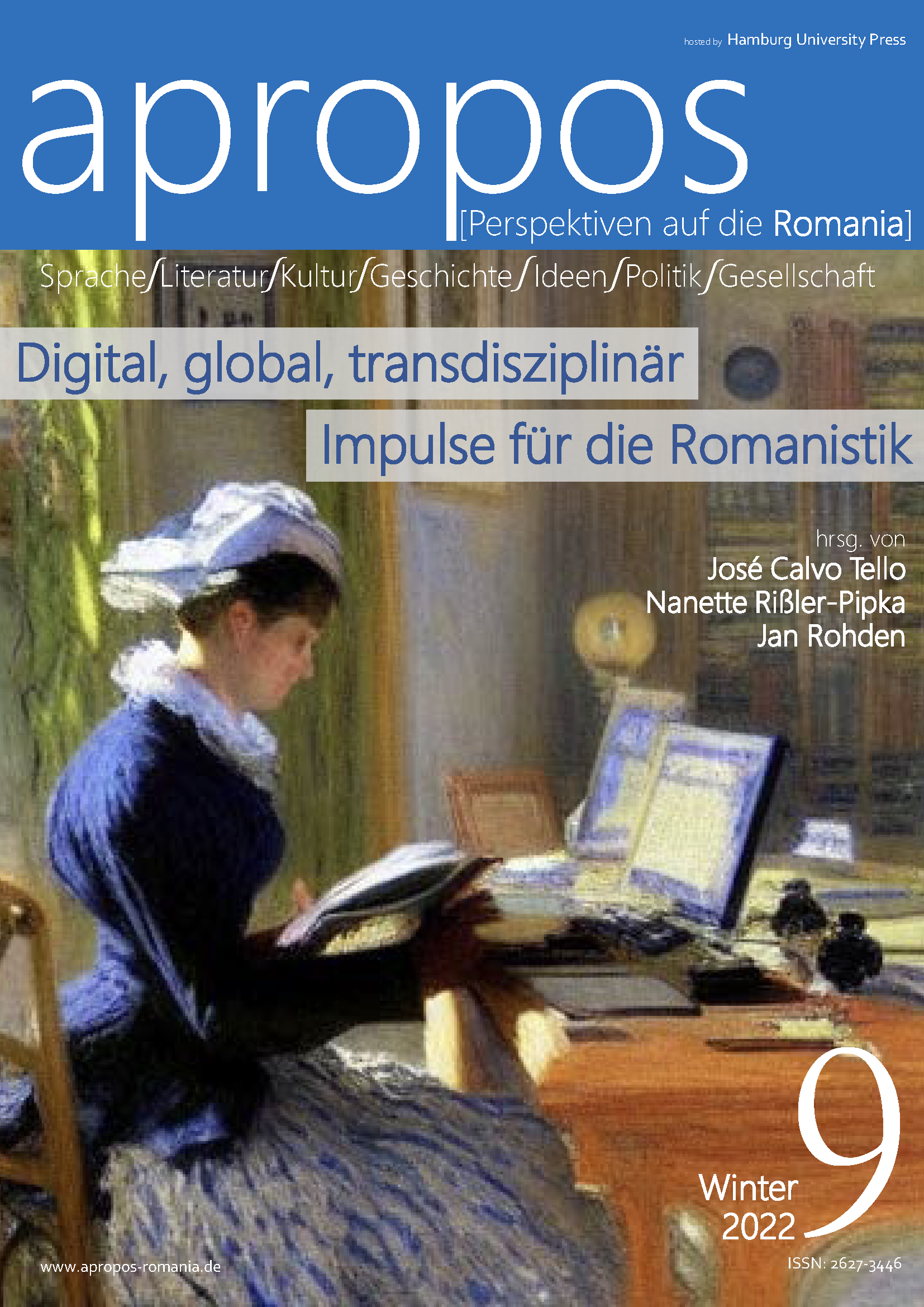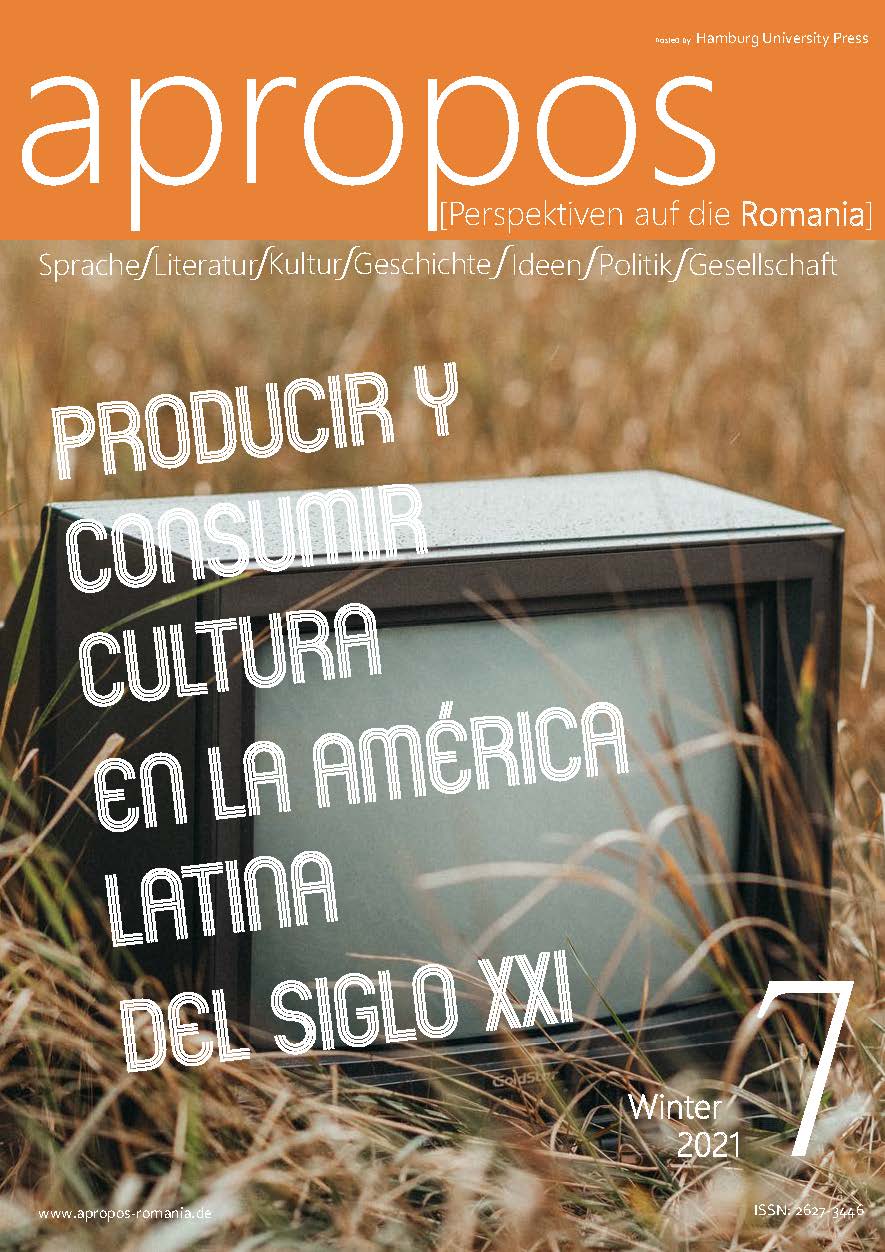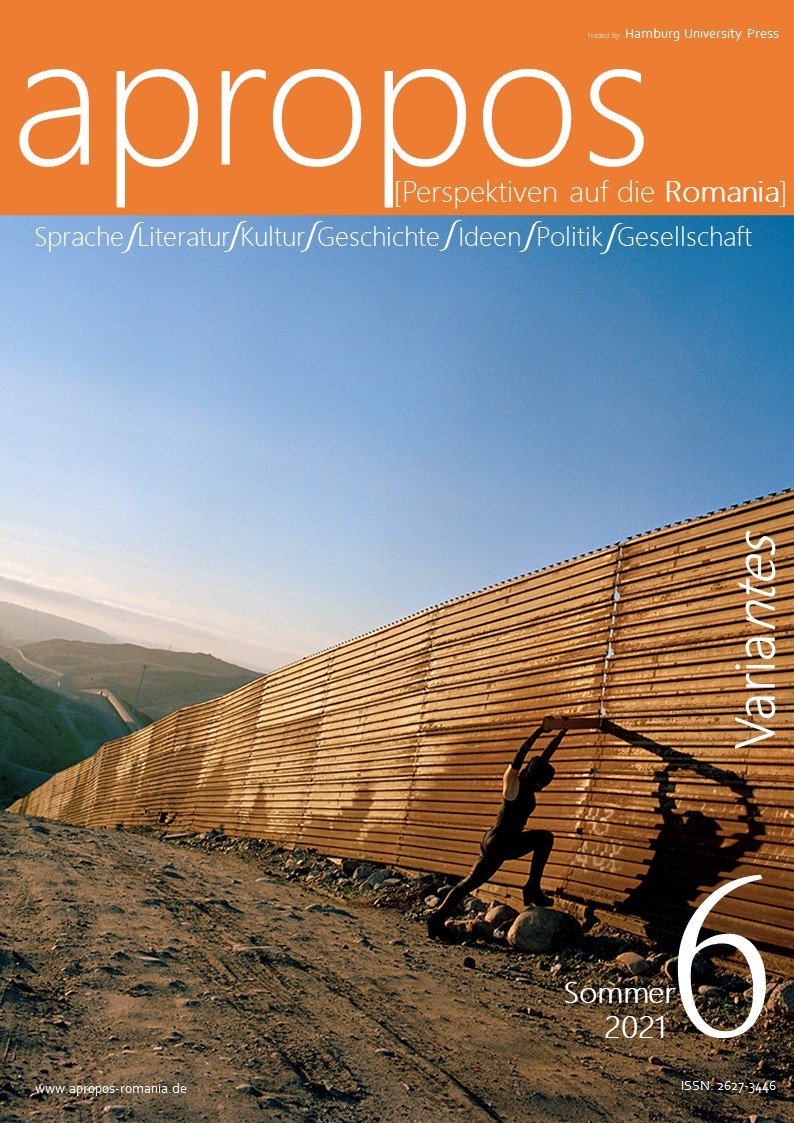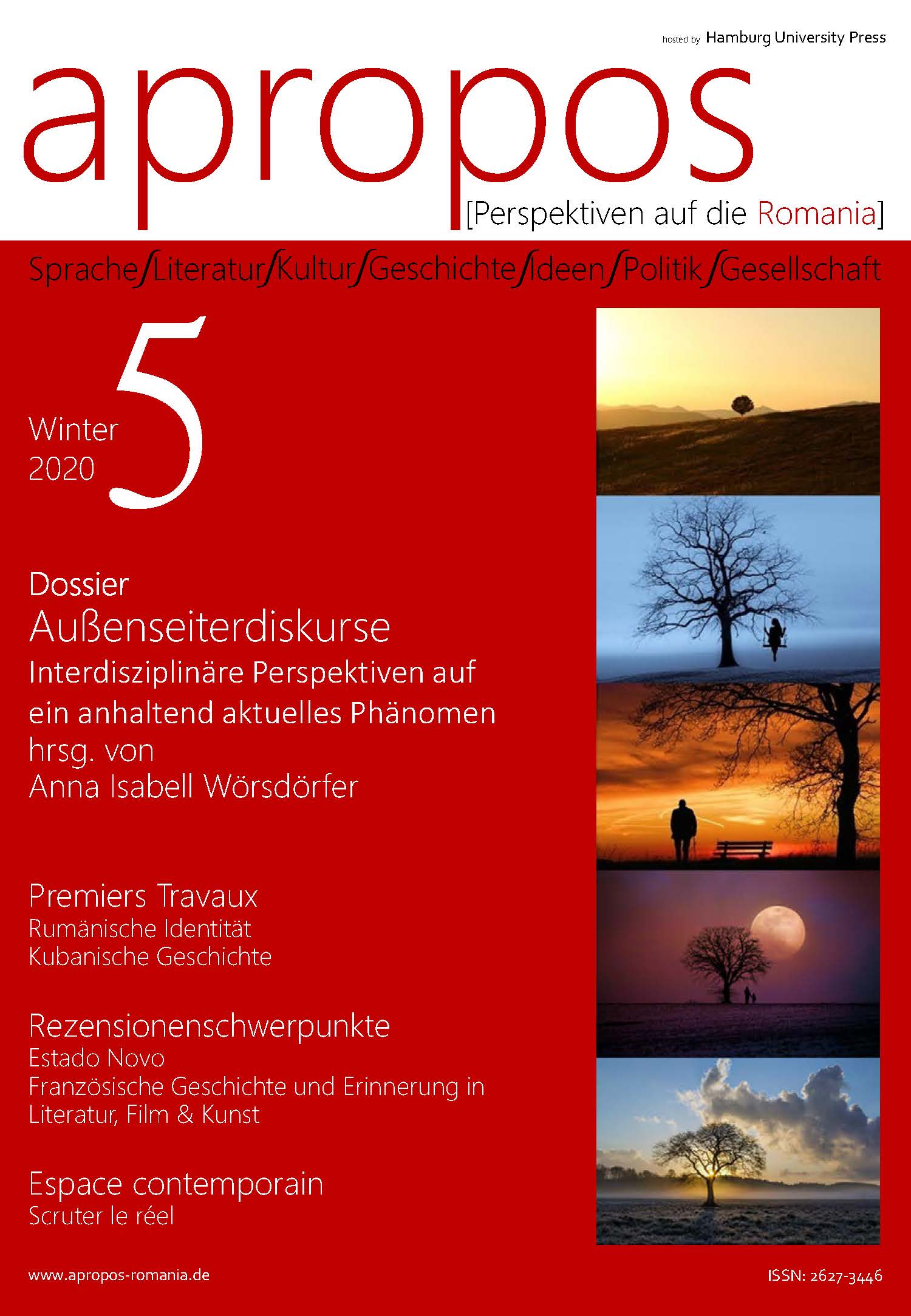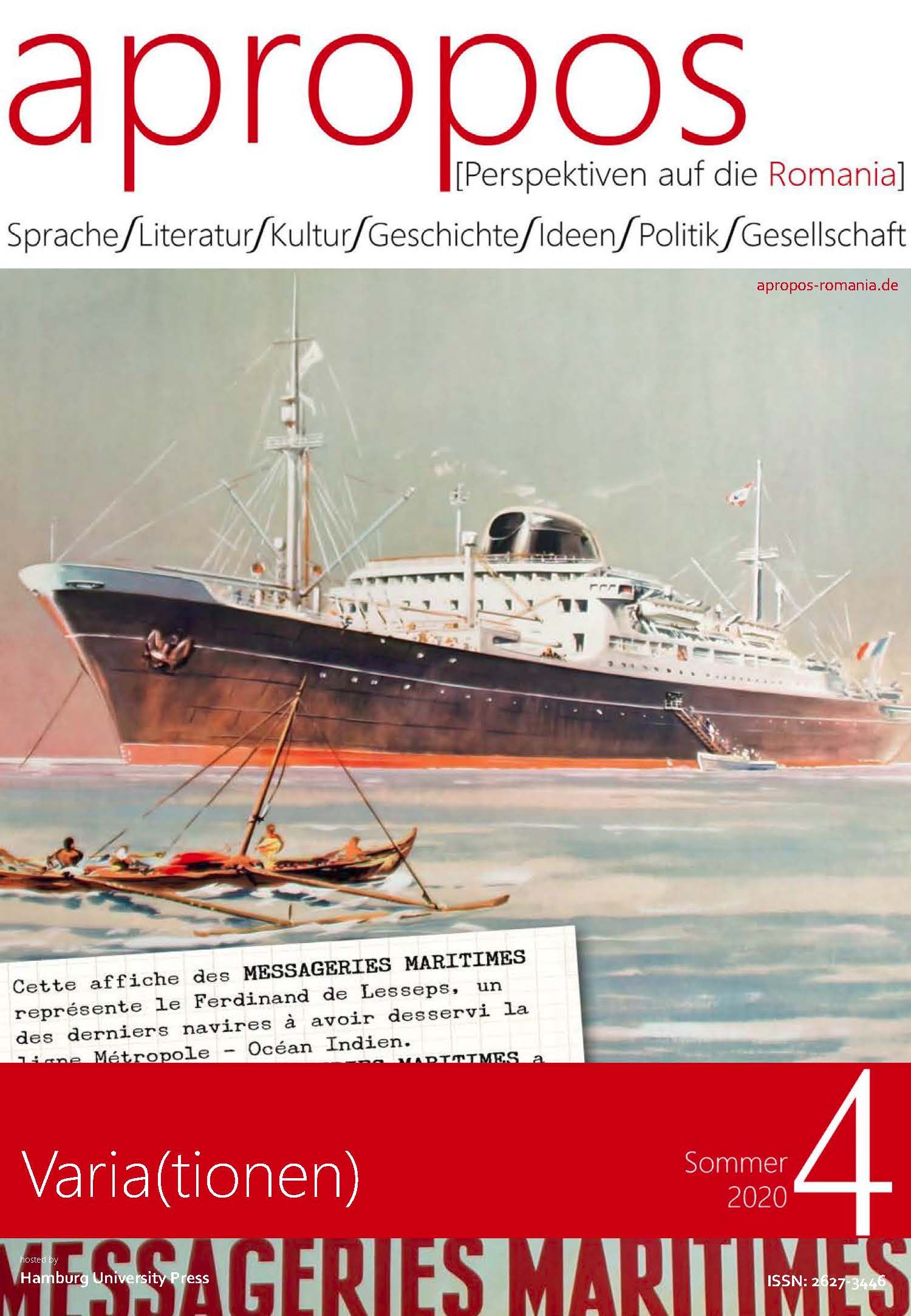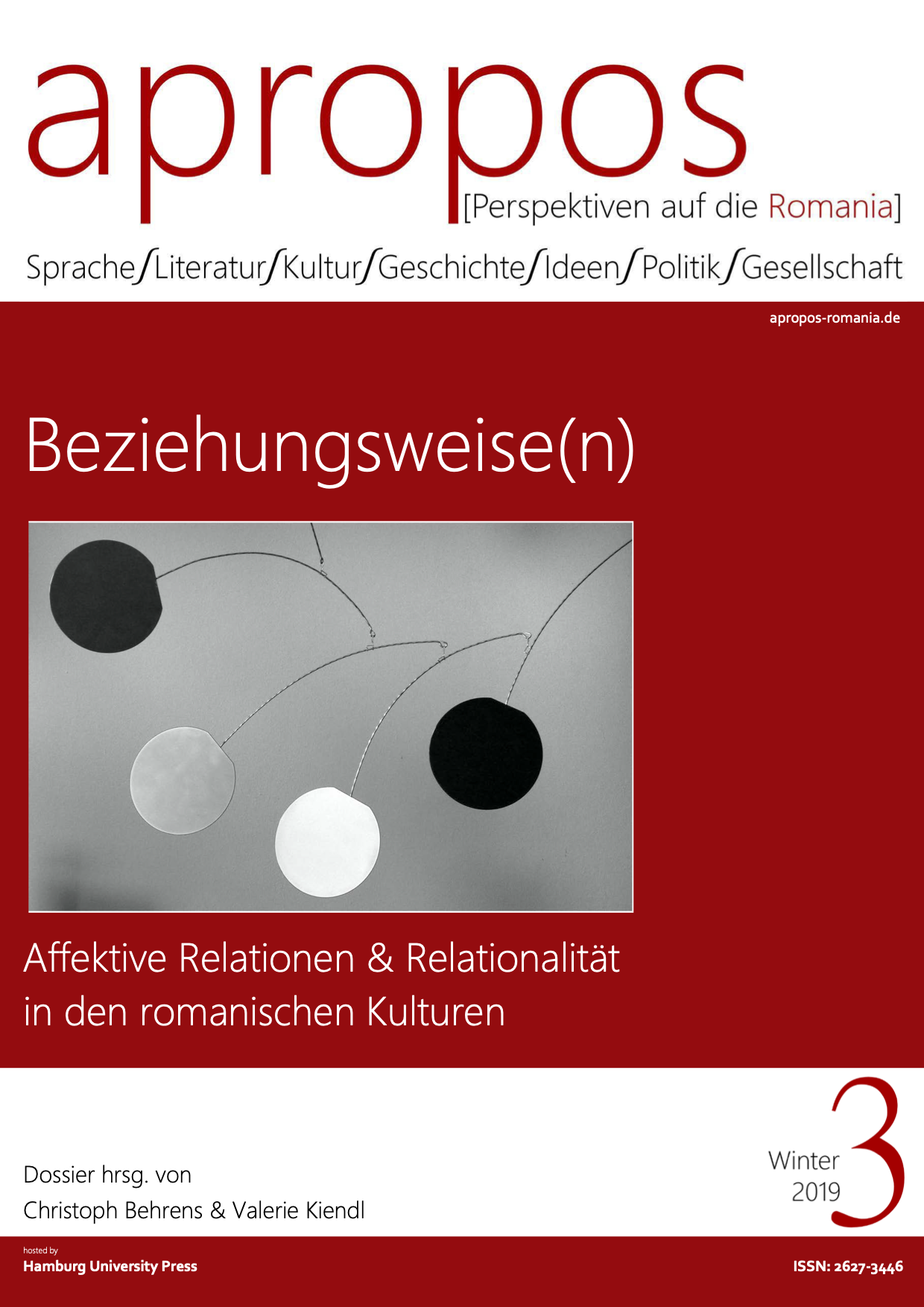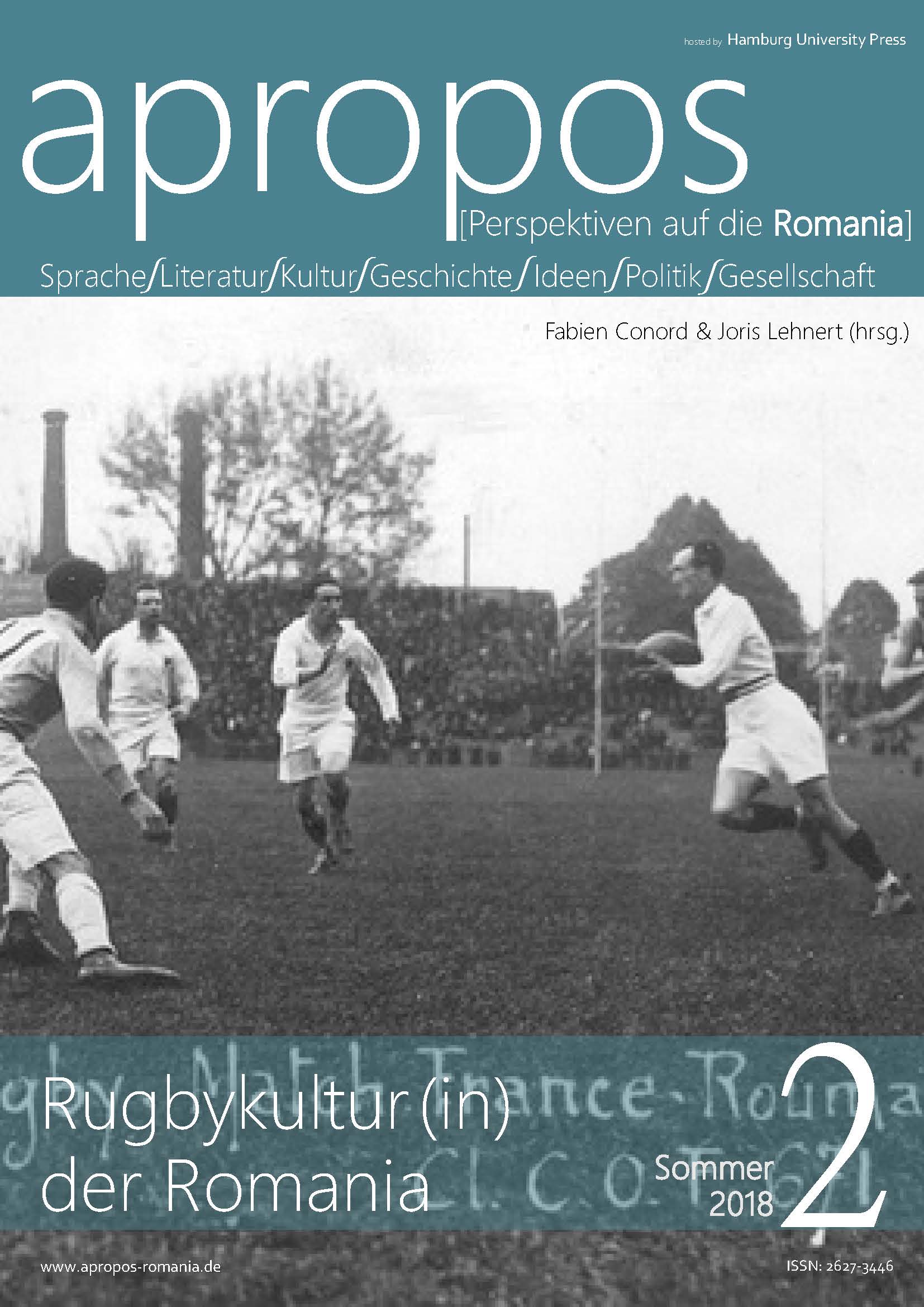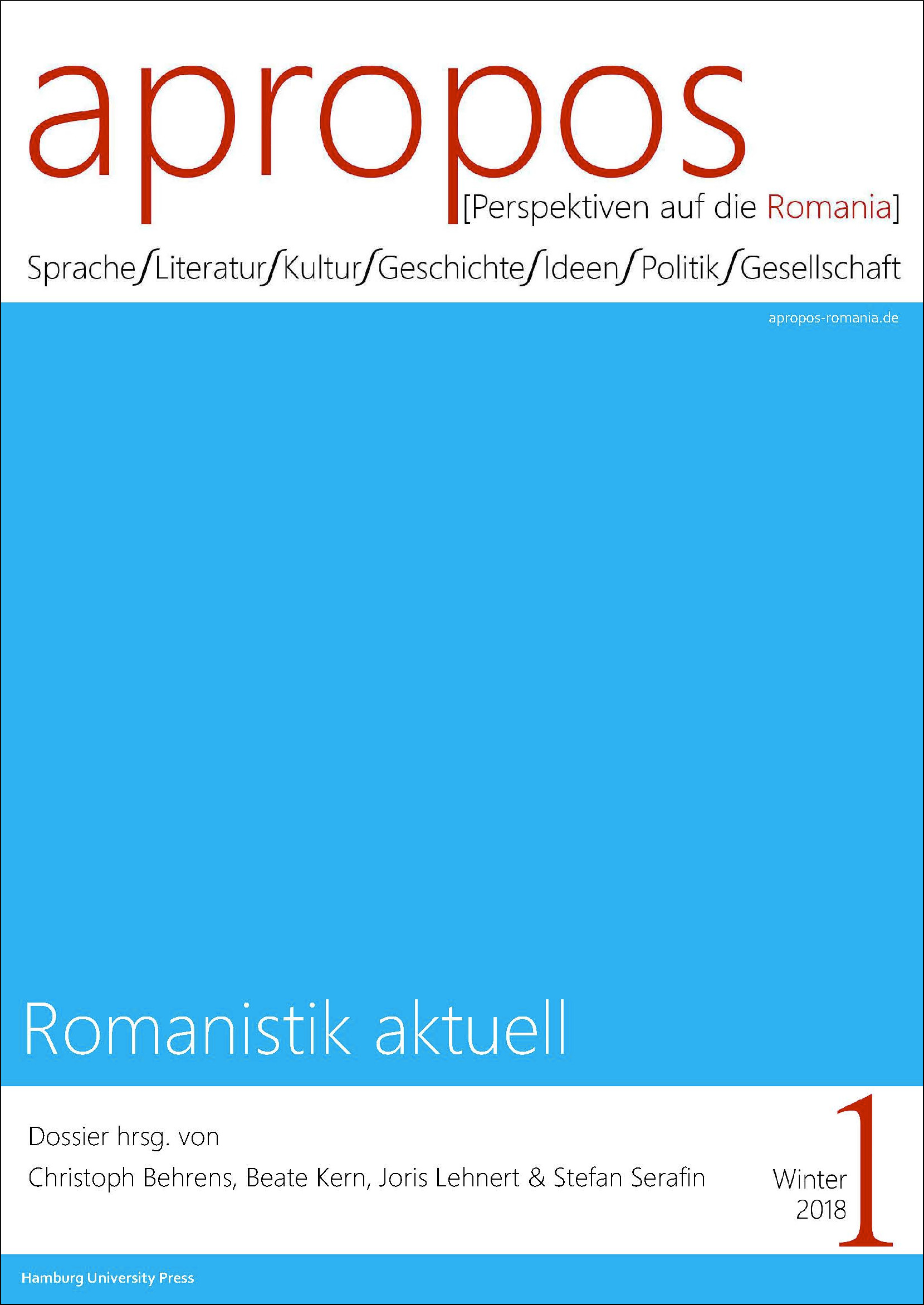
Archives
-
Wie Worte Berge versetzen. Spielarten literarischer Raum-Präsenzen in narrativen Texten vom 19.-21. Jahrhundert
No. 14 (2025)The contributions in this special issue examine French, Spanish and Italian narrative texts in the broadest sense (from travelogues and regional novels to utopias, dystopias and science fiction novels, among others) under the lingering influence of the spatial turn. They explore the textual and narrative procedures by means of which remembered, traveled, experienced, suffered, constructed, imagined and virtual spaces are visualized, by means of which reciprocity between present and imagined spaces is achieved. In this endeavor, movement in space and its narrative representation are just as important as the spaces moved and transformed by words. Special issue edited by Hanna Nohe and Marina O. Hertrampf
-
Varia
No. 13 (2024)Die Beiträge der 13. Ausgabe von apropos spiegeln das wider, wofür apropos Raum bieten möchte: Beiträge in verschiedenen Sprachen (in dieser Varia-Ausgabe Deutsch, Französisch und Spanisch), Beiträge, die sowohl für die Italianistik (Alessandra Stazzone), für die Hispanistik (Sofina Dembruk, Mariana C. Marchese zusammen mit Cecilia L. Romero und Natalia M. Montero, Karolin Schäfer) als auch für die Frankoromanistik (Stève Bessac-Vaure, Margot Brink, Joris Lehnert, Jacopo Romei) sowie in gesamt-romanistischer Perspektive (Lydia Schmuck) relevant sind; Beiträge von Autor*innen mit unterschiedlichen geografischen (Argentinien, Frankreich, Italien und Deutschland) und disziplinären Hintergründen (Literatur- und Kulturwissenschaft, Geschichtswissenschaft, Fachgeschichte, Sprachwissenschaft, Rechtswissenschaft, Psychologie).
-
Pop. Kultur. Literatur. Frankreich in den 1990er Jahren
No. 12 (2024)Das Dossier der 12. Ausgabe von apropos zum Thema „Pop. Kultur. Literatur. Frankreich in den 1990er Jahren“ hat seinen Ursprung in einer Sektion zu diesem Thema auf dem 13. Kongress des Frankoromanistenverbands in Wien im September 2022. Beleuchtet wird die Verwobenheit von Kultur und Kulturpolitik mit Literatur und Pop im weitesten Sinne – also spezifisch als Popmusik bis hin zu den unterschiedlichsten Manifestationen der Pop- und auch Populärkultur – in den 1990er Jahren, die die Herausgeber als eine „vergessene Schwellenzeit“ verstehen. Dossier hrsg. von Timo Obergöker & Marcel Vejmelka.
-
Bauern als Schriftsteller (20./21. Jhdt)
No. 11 (2023)The importance of the peasantry in Western society has declined sharply. Against this background, there has been a proliferation of first-hand accounts, and then fiction, about this social group. In the 1970s, a collection of writings, often by journalists but also by social scientists, met with considerable response. Towards the end of the decade, fiction took over. This literature, often scorned or at least ignored by Parisian literary critics, became a real success with the public. However, as in the 19th century, a distinction had to be made between the authors. Many of them came from rural families, but most of them lived in towns and very few of them worked in agriculture. This dossier is therefore devoted to this particular category of writer: the "peasant writer". Coordinated by Fabien Conord & Timo Obergöker.
-
Künste des Dazwischen: Graphische Literatur und visuelle Poesie der Romania als Genres ‘en marge‘
No. 10 (2023)Graphic literature and visual poetry can be understood as arts of the in-between in at least two ways: on the one hand, they combine image and text as aesthetic and semantic means of expression; on the other, they reflect this in-between position via intermedial references and an affinity for themes of interspatial, marginal(ized) experience. Their genre-forming and genre-breaking specificities can be found in their engagements with multidimensional character/image relationships, with semantic determination and opening, with boundary transgressions, and with shifts between different semiotic systems. This dossier brings together media-comparative perspectives on different expressions of image-text relations as a way to identify and conceptualize characteristics and potentials of the in-between. Edited by Julia Dettke & Jasmin Wrobel.
-
Digital, global, transdisziplinär: Impulse für die Romanistik
No. 9 (2022)Romance Studies takes on the effects of digitization and faces its own challenges (e.g., multilingual data), but also opportunities (e.g., through traditions of transdisciplinarity) in comparison to other subject areas. Although digital resources such as editions, corpora, or dictionaries have a long tradition in Romance Studies, an increasing number of digital methods open up new ways for research. Such methods not only enable additional intradisciplinary approaches for research in the sub-disciplines of Romance Studies, but also create transdisciplinary synergies between different fields of work. Based on contributions from various areas of research in the Romance Studies, this dossier illustrates how digital approaches can provide impulses for both intra- and transdisciplinary research. It includes three chapters: 1) Computational Literary Studies, 2) Metadata - Libraries - Infrastructures, 3) Computational Linguistics and Language Data. Ed. by José Calvo Tello, Nanette Rißler-Pipka & Jan Rohden.
-
Toponyme und Erinnerungskultur in der Romania
No. 8 (2022)Toponyms represent a class of names that refer to geographical entities both on the surface of the earth and in outer space. This dossier is concerned with the question of the extent to which place names can be immaterial carriers of memory cultures in the Romance linguistic and cultural area. In this context, toponyms in (post-)colonial contexts as well as in different (sometimes conflict-laden) language and cultural contact situations are examined. A further aim is to show possibilities of toponymic research beyond etymological questions and to shed light on the topic of toponymic memory culture from different research perspectives in Romance studies. Accordingly, the contributors take not only linguistic, but also literary and cultural studies perspectives. Edited by Sandra Herling and Maribel Cedeño Rojas
-
Producir y consumir cultura en la América Latina del siglo XXI
No. 7 (2021)The 7th issue of apropos [Perspektiven auf die Romania] contains, in addition to papers in the Premiers travaux section, a dossier entitled "Producir y consumir cultura en la América Latina del siglo XXI" (ed. Diego Labra and Javier Guiamet), which looks at the development and specificities of the consumption of cultural products in 21st century Latin America, with a particular focus on Argentina. Moreover, the new section "Forum. Perspectives on Romance Studies" will in future provide space to discuss the current and target state of Romance Studies.
-
Varia
No. 6 (2021)The second Varia and thus 6th issue of apropos [Perspektiven auf die Romania] not only offers a multifaceted selection of Varia articles from the Romance Studies disciplines of cultural studies, literature, media studies, linguistics, and didactics, each of which, as is apropos’s aim, looks beyond its own disciplinary, and in some cases also spatial and medial, horizons, but also reviews and a portrait of female artists are included in this new issue. Above all, however, it should be emphasized that in this 6th issue, the sections "Werkstatt" and "Premiers travaux" have been brought to the fore.
-
Outsider discourses: interdisciplinary perspectives on a persistingly recurring phenomenon
No. 5 (2020)Social outsiders seem to be omnipresent in Western societies, shaped as they are by historical discourses of exclusion (such as the witch hunts, colonization, the Shoah, ...); but also the resurgence of protectionist nationalism in many places today, accompanied by violence between religions and ethnic groups, as well as the observable backlash against emancipatory movements and egalitarian changes within society are just some of the current symptoms of this conjuncture of outsiderism. All these waves of persecution can be characterized as ideologically motivated campaigns of established groups against stigmatized and rigorously marginalized minorities: In all manifestations, power structures are at work that have left their traces in the diverse and competing discourses of outsiders and about outsiders, to which this dossier is dedicated.
-
Varia(tionen)
No. 4 (2020)In the first three issues, apropos [Perspektiven auf die Romania] put its main focus on the various facets of the Romance-speaking world from an interdisciplinary and cultural studies perspective transgressing romance studies division into linguistic, literature and culture. So far, publication formats adopted have mostly been peer-reviewed research articles and reviews yet exploiting the medial spectrum of the hypertextual online format. The current fourth issue is dedicated to several freer formats and takes variation of formats and perspectives even further. Contributions in German, Spanish and French stemming from different horizons joined in one miscellaneous section with traditional research papers as well as formats like Premiers Travaux (mentoring for excellent student papers), essay, literature review and Espace Contemporain presenting contemporary art forms. Thus, the issue is divided in three parts, although varying one from the other nevertheless complement each other.
-
Beziehungsweise(n) – Affektive Relationen und Relationalität in den romanischen Kulturen
No. 3 (2019)Mithilfe der Denkfigur der Beziehungsweise(n) soll ein Ausgangspunkt für die Beschreibung und Theoretisierung jener Relationen und Relationalitäten in ihren soziokulturellen, historischen und gegenwärtigen Dynamiken, aber auch in ihrer ästhetisch modellierten Performativität gefunden werden. Ziel des Dossiers ist es, eine Ästhetik und soziokulturelle Praxis der „Beziehungsweise(n)“ zu denken, die nicht nur im Verhältnis der Medien zueinander, in der Verbundenheit intramedial agierender personae und mit den Rezipient*innen besteht, sondern die sich auch in den Lebensweisen der Rezipient*innen selbst widerspiegelt und sich somit auf ihr affektives Handlungswissen auswirkt.
-
Rugbykultur (in) der Romania
No. 2 (2019)Passend zur kommenden Rugby-Weltmeisterschaft (20. September - 2. November 2019) bietet apropos [Perspektiven auf die Romania] ein Dossier zum Thema "Rugbykultur (in) der Romania" an. Entgegen der Auffassung, dass Rugby fast ausschließlich britischer Prägung ist, widmet sich das Dossier der zweiten Ausgabe jener romanischen Rugbykultur in Europa, die in den versammelten Beiträge in einer sprachlichen, kulturellen sowie disziplinären Vielfalt ergründet wird. Peu à peu werden alle Dossierbeiträge auch in Übersetzung erscheinen; die Ausgabe wird dementsprechend aktualisiert werden.
Dossier herausgegeben von Fabien Conord und Joris Lehnert.
-
Romanistik aktuell
No. 1 (2018)Eine Idee hat konkrete und zugleich ‚offene‘ Form angenommen: Die Zeitschrift apropos [Perspektiven auf die Romania] versucht in mehrfacher Hinsicht eine Öffnung des traditionellen Print-Zeitschriftenformates: Öffnung der traditionellen Teildisziplinen der Romanistik zum Dialog untereinander und darüber hinaus, Öffnung des Zugangs dank Open Access, Öffnung für die Möglichkeiten des digitalen Mediums anhand audio-/audiovisueller Beiträge, Öffnung für neue Formate, Öffnung für ein vielfältiges Publikum, Öffnung für einen Dialog zwischen etablierten und jüngeren Forscher*innen. Die erste Nummer beinhaltet u. a. jene Beiträge, die im Sommersemester 2018 in einer Ringvorlesung an der Universität Rostock unter dem Titel „Romanistik aktuell“ präsentiert wurden. Die Vielfalt der Perspektiven auf romanische Themen, die in diesen Beiträgen eingenommen werden, illustrieren treffend einerseits die fachübergreifende, andererseits die mediale Öffnung, die das Projekt apropos antreibt.



